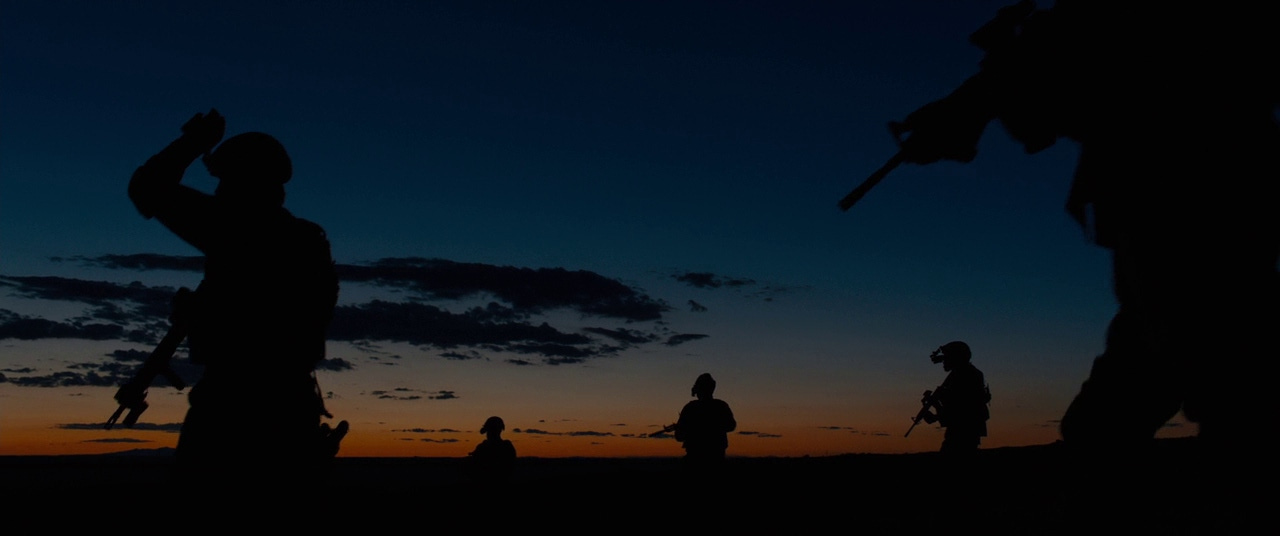Sicario and the American Consciousness
Aesthetics as an Illusion of Power
Sicario, Denis Villeneuve, 2015
Enough already. I cannot believe that I’m actually writing a second essay regarding one of the single dumbest foreign policy proposals of my lifetime—yet here I am. It seems like this idea of some form of unilateral military intervention in Mexico will just not go away.
Now to attempt to decipher any real plan for any of this is a fool’s errand. There is none. It’s nothing more than poorly formulated rhetorical blustering that plays to crowds. It consists primarily of vague ideas about blockading Mexico (an act of war under international law) or some notion of going into Mexico to “take out the cartels”.
None of this really means much of anything. It has the same level of consistency as the generalized nothingness that characterized the Russian propagandists who formulated the invasion of Ukraine as being a “de-Nazification” effort. Except in this circumstance, it would be more apt to describe the proposal as an American Special Military Operation to de-cartelize Mexico.
What this rhetoric really produces is a generalized consciousness—a political tendency that provides the will for obtaining a concrete object. The actual policy wonks will sort out the actual details of what any proposed intervention would look like in practice, but the political commentator class has created the conditions sufficient to provide popular assent in the GOP to embark on whatever campaign is necessary.
The popular assent to most of this is predicated on a mythos of what military power can actually do.
Sicario as a film is primarily concerned with deconstructing what American force can reasonably accomplish in the face of difficult and intractable socio-political problems. It is bleak, offers no real solution, and generally tends towards an idea that violence is a fundamentally incurable fact of being human.
But as an aesthetic mode of relating to the world? It offers a surface-level attraction that I think also plays an operative part in the ongoing GOP fascination with using military force in Mexico. It is of course really fucking cool to watch the shot of guys flipping their NVGs on as they walk into the setting sun. It is quite frankly one of my favorite shots in all of cinema—an opinion I doubt I’m alone in sharing.
Sicario, Denis Villeneuve, 2015
This is the style and form of imagery that I think dominates the minds of most people when they hear DeSantis loudly pronounce that he will send in SOF guys to raid cartels across the border. American forces go in and get the bad guys, no further thought really required. I can imagine more than one guy down in Fort Liberty would agree that it all sounds cool as hell in theory.
But what are we really doing here? We’re talking about unilateral military action against a treaty ally. It’s the beginning of an extended military campaign where military force cannot solve the primary issues driving the violence and instability in Mexico. You can’t just shoot your way out of being the world’s largest market for drug use, and you sure as fuck can’t JDAM your way into solving instability on your border.
The problem with all of this of course is that aesthetics animates people to action. I’m of course guilty of this, I think the traffic jam on the Mexico Bridge is fucking awesome. Who couldn’t think Steve Forsing shaking his head at a car full of sicarios before gunning them down the second they flinch isn’t what everyone joined the military for?
I think the GOP wants to use unilateral force in Mexico for essentially the same reasons. It just feels good. I suspect for the more National Conservative-leaning crowd it represents something like violence as a method of aesthetic national renewal. The sort of grand use of force that asserts America can still fucking kill people whenever we want.
The characters of Sicario to me at least are compelling for this central reason—they are outside the bounds of good or evil. They exist in one of the last remaining small spaces of the world where an individual is still (for lack of a better term) free. They are some of the few remaining individuals who move about unrestrained from the petty demands of what polite society thinks of them.
The impulse driving the “shoot everyone at the border” and “JDAM them” exists on a similar spectrum—it is to say at least subliminally that the United States has no real obligations that bind us. Our treaty alliance with Mexico and international law means nothing to us. We have the power to exercise force and we will use it.
When people see a candidate or commentator start to argue about an amorphous use of violence that would blatantly break all ethical norms we have established since 1945, the message that they get is that the United States stands apart from the rest and does as it wishes, and by extension so do you.
This is all good and well for the sake of making compelling cinema, but it hardly makes for a national security strategy that is effective or moral.
Mexico is the largest trading partner of the United States, more than 20 million Americans are from Mexico, and we are already helping the Ukrainian people fend off an authoritarian war of conquest. The international community would rightfully condemn us for this, and we would burn through much of the goodwill desperately needed to hold together the coalition opposing Russia alongside the competition with China.
This isn’t to say I’m a complete pacifist or that I think we should do nothing. American policy should focus on working alongside our Mexican partners. We have options to work cooperatively through governmental and security assistance to combat the very real problems that the cartels pose.
But these proposals for unilateral force? They’re nothing more than the substitution of rational policies for the animating aesthetics of violence.


